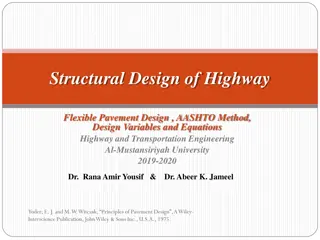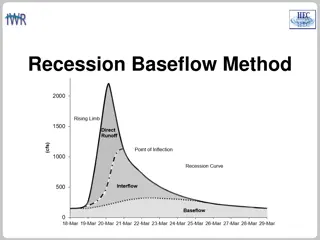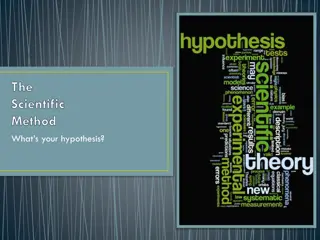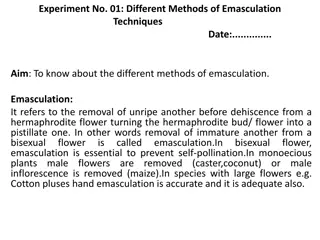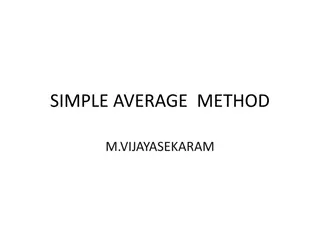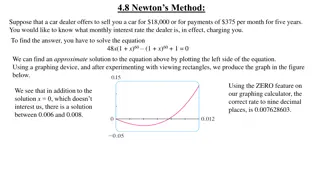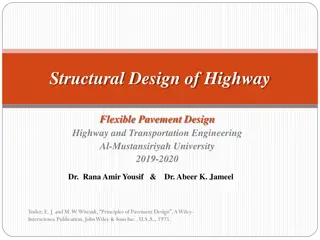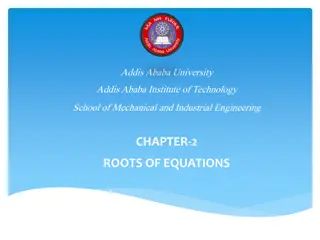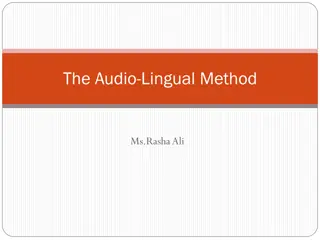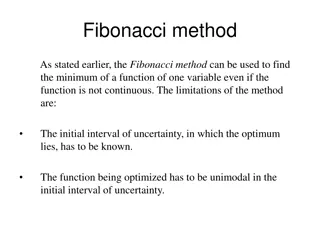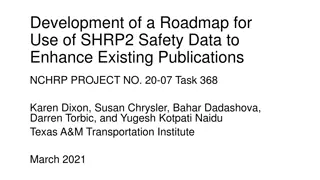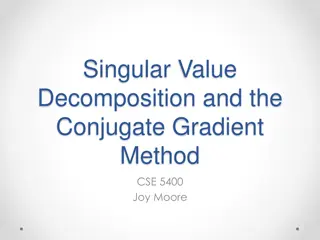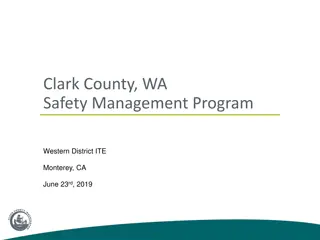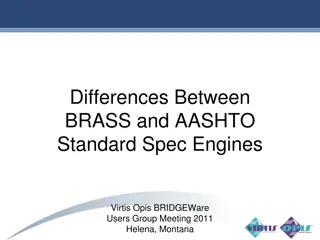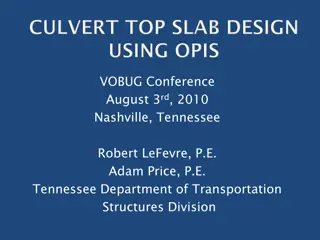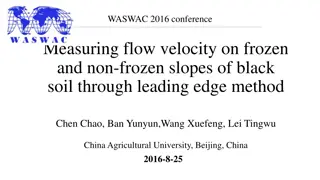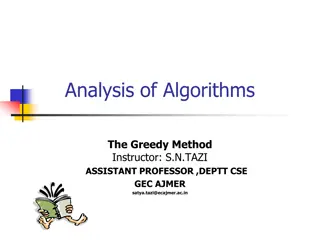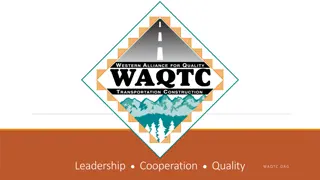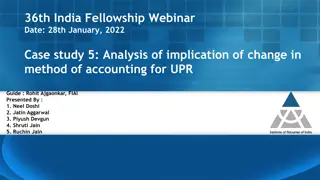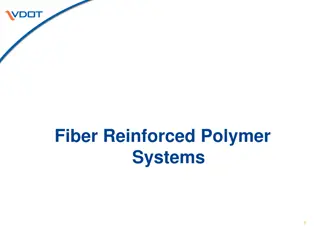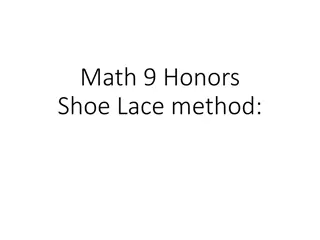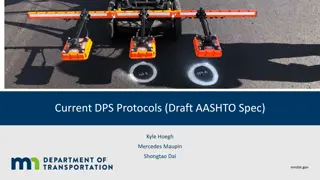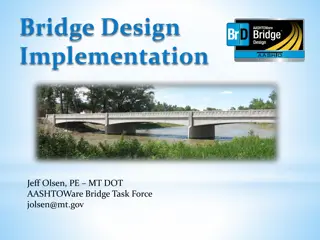Language Teaching Techniques: GTM, Direct Method & Audio-Lingual Method
Explore the Grammar-Translation Method, Direct Method, and Audio-Lingual Method in language teaching. Understand principles, objectives, and methodologies with insights into language learning approaches. Enhance teaching skills and foster effective communication in language education.
3 views • 82 slides
AASHTO Method for Highway Flexible Pavement Design
The AASHTO method for highway flexible pavement design is based on the AASHO Road Test results and has been revised over the years to provide guidelines for pavement structural design. It emphasizes performance period, time constraints, and design variables to ensure long-lasting and cost-effective
1 views • 25 slides
Understanding the Recession Baseflow Method in Hydrology
Recession Baseflow Method is a technique used in hydrology to model hydrographs' recession curve. This method involves parameters like Initial Discharge, Recession Constant, and Threshold for baseflow. By analyzing different recession constants and threshold types such as Ratio to Peak, one can effe
0 views • 8 slides
Understanding the Scientific Method: A Logical Framework for Problem-Solving
The Scientific Method is a systematic approach used to solve problems and seek answers in a logical step-by-step manner. By following key steps such as stating the problem, researching, forming a hypothesis, testing, analyzing data, and drawing conclusions, this method helps clarify uncertainties an
1 views • 18 slides
Introduction to Six Thinking Hats Method for Effective Group Decision Making
Explore the Six Thinking Hats method, a powerful tool for facilitating group discussions and decision-making processes. This method encourages participants to approach problems from various perspectives represented by different colored 'hats'. By simplifying thinking and fostering constructive dialo
1 views • 24 slides
Understanding Corn Growth Stages: Leaf Staging Methods and Considerations
Various leaf staging methods, including the Leaf Collar Method and Droopy Leaf Method, are used to identify corn plant growth stages. The Leaf Collar Method involves counting leaves with visible collars, while the Droopy Leaf Method considers leaves at least 40-50% exposed from the whorl. Factors li
0 views • 9 slides
Understanding Different Emasculation Techniques in Plant Breeding
Learn about the significance of emasculation in plant breeding to prevent self-pollination and facilitate controlled pollination. Explore various methods such as hand emasculation, forced open method, clipping method, emasculation with hot/cold water, alcohol, suction method, chemical emasculation,
2 views • 10 slides
Simple Average Method in Cost Accounting
Simple Average Method, introduced by M. Vijayasekaram, is a technique used for inventory valuation and delivery cost calculation. It involves calculating the average unit cost by multiplying the total unit costs with the number of receiving instances. This method simplifies calculations and reduces
2 views • 5 slides
Understanding Newton's Method for Solving Equations
Newton's Method, also known as the Newton-Raphson method, is a powerful tool for approximating roots of equations. By iteratively improving initial guesses using tangent lines, this method converges towards accurate solutions. This method plays a crucial role in modern calculators and computers for
0 views • 12 slides
AASHTO Method for Determining Effective Roadbed Soil Resilient Modulus
The AASHTO method provides a systematic approach for evaluating the effective roadbed soil resilient modulus in flexible pavements. It involves calculating the relative damage to pavements based on predicted traffic load and allowable load repetitions. The method considers the seasonal moduli values
0 views • 30 slides
Understanding the Conjugate Beam Method in Structural Analysis
The Conjugate Beam Method is a powerful technique in structural engineering, derived from moment-area theorems and statical procedures. By applying an equivalent load magnitude to the beam, the method allows for the analysis of deflections and rotations in a more straightforward manner. This article
1 views • 11 slides
Understanding Roots of Equations in Engineering: Methods and Techniques
Roots of equations are values of x where f(x) = 0. This chapter explores various techniques to find roots, such as graphical methods, bisection method, false position method, fixed-point iteration, Newton-Raphson method, and secant method. Graphical techniques provide rough estimates, while numerica
0 views • 13 slides
Binary Basic Block Similarity Metric Method in Cross-Instruction Set Architecture
The similarity metric method for binary basic blocks is crucial in various applications like malware classification, vulnerability detection, and authorship analysis. This method involves two steps: sub-ldr operations and similarity score calculation. Different methods, both manual and automatic, ha
0 views • 20 slides
Exploring the Audio-Lingual Method in Language Teaching
The Audio-Lingual Method is an oral-based approach that focuses on drilling students in grammatical sentence patterns through behavioral psychology principles. This method, also known as the Michigan Method, emphasizes habit formation and uses techniques like dialogues, repetition drills, and role-p
1 views • 16 slides
Understanding the Kinetics of Fast Reactions in Chemistry
Kinetic methods involve measuring analytical signals under dynamic conditions to study fast reactions in chemistry. This study explores the various methods used, such as Flow Method and Stopped Flow Method, to determine reaction rates accurately. Advantages of the Stopped Flow Method over Continuous
0 views • 18 slides
Understanding the Fibonacci Method for Function Optimization
The Fibonacci method offers a systematic approach to finding the minimum of a function even if it's not continuous. By utilizing a sequence of Fibonacci numbers, this method helps in narrowing down the interval of uncertainty to determine the optimal solution through a series of experiments. Despite
1 views • 19 slides
Enhancing Safety Data to Improve AASHTO Policy
Roadmap developed by Texas A&M Transportation Institute outlines utilizing SHRP2 safety data to enhance key AASHTO documents. The project involved literature review, SME interviews, and trends in research topics related to roadway safety. Identified challenges include data access, sample size limita
0 views • 12 slides
Determination of Chloride by Mohr Method
Precipitation titration is a volumetric method used for determining chloride ions. Mohr's method involves reacting alkaline or alkaline earth chlorides with silver nitrate in the presence of a potassium chromate indicator. The endpoint of the titration is signaled by the appearance of red silver chr
0 views • 9 slides
Determination of Dipole Moment in Chemistry
The determination of dipole moment in chemistry involves methods such as the Temperature Method (Vapour Density Method) and Refractivity Method. These methods rely on measuring various parameters like dielectric constants and polarizations at different temperatures to calculate the dipole moment of
1 views • 15 slides
Accounting Entries in Hire Purchase System for Credit Purchase with Interest Method
In the Credit Purchase with Interest Method of Hire Purchase System, assets acquired on hire purchase basis are treated as acquired on outright credit basis with interest. This method involves initial entries for recording the asset acquisition, down payments, interest on outstanding balance, instal
0 views • 10 slides
Understanding Singular Value Decomposition and the Conjugate Gradient Method
Singular Value Decomposition (SVD) is a powerful method that decomposes a matrix into orthogonal matrices and diagonal matrices. It helps in understanding the range, rank, nullity, and goal of matrix transformations. The method involves decomposing a matrix into basis vectors that span its range, id
0 views • 21 slides
Understanding Scatter Diagram Method for Correlation Analysis
Scatter Diagram Method is a simple and effective way to study the correlation between two variables. By plotting data points on a graph, it helps determine the degree of correlation between the variables. Perfect positive and negative correlations, as well as high and low degrees of correlation, can
0 views • 11 slides
Clark County Safety Management Program Overview
The Clark County Safety Management Program aims to improve traffic safety through data-driven approaches, prioritizing projects for maximum impact and cost-effectiveness. By analyzing crash data and roadway characteristics, the program identifies high-priority locations for safety improvements, deve
1 views • 26 slides
Subnational Population Projections Using Ratio Method: Advantages and Variations
The ratio method, particularly the constant share and shift-share variations, is commonly used for projecting small area populations when data for the component method are lacking. It involves holding the smaller area's share of the parent population constant or allowing for changes over time. Care
1 views • 12 slides
Comparison of BRASS and AASHTO Standard Specifications in Bridge Engineering
Explore the key differences between the BRASS-GIRDER and AASHTO Standard Specification engines in bridge design calculations. Topics covered include load factor calculations, live load distribution factors, transverse live load application, critical vehicle positions, and member stiffness considerat
1 views • 28 slides
Modern Culvert Design Innovations in Tennessee's Transportation Infrastructure
Explore the evolution of culvert design in Tennessee, from the shift from moment connections to shear connections, adoption of AASHTO standards for federal funding compliance, and the utilization of pinned connections for efficient design and modeling in Opis and Excel spreadsheets.
4 views • 71 slides
Measurement of Flow Velocity on Frozen and Non-Frozen Slopes of Black Soil Using Leading Edge Method
This study presented a detailed methodology for measuring flow velocity on frozen and non-frozen slopes of black soil, focusing on the Leading Edge method. The significance of shallow water flow velocity in soil erosion processes was emphasized. Various methods for measuring flow velocity were compa
0 views • 23 slides
AASHTO Pavements Working Group Meeting Overview
The AASHTO Pavements Working Group meeting from July 18, 2011, covered various topics including self-introductions, research updates, NCHRP and TRB updates, FHWA Transportation System Preservation Roadmap, and SCOM vision and mission. Discussions were held on membership details, meeting locations, a
0 views • 22 slides
AASHTO Bridge Design-Rating Overview 2022
Explore the AASHTO Bridge Design-Rating Overview for 2022, including changes in project management, revenue comparisons, expenditures breakdown, and software solutions offered. Learn about AASHTOWare Program Management and the importance of using AASHTOWare for incorporating best practices in transp
0 views • 15 slides
Overview of Greedy Method in Algorithm Analysis
The Greedy Method in algorithm analysis involves making locally optimal decisions that eventually lead to a globally optimal solution. This method is illustrated through examples such as finding the shortest paths on special and multi-stage graphs, and solving the activity selection problem. While t
0 views • 16 slides
WAQTC - Leadership, Cooperation, Quality
Providing leadership in transportation construction quality improvement through cooperation among member agencies such as CFL and WFL AKDOT&PF, CDOT, ITD, MDT, ODOT, UDOT, and WSDOT. WAQTC focuses on standardizing test methods, developing AASHTO standards, offering training and qualification program
0 views • 8 slides
AASHTO Bridge Design and Rating Strategies Overview
Explore outreach and marketing initiatives, revenue trends, and expenditure breakdowns for the AASHTO Bridge Design-Rating program. Discover strategies for expanding user base, incorporating feedback, and driving modernization. Dive into the DOT-driven software solutions and AASHTOWare program manag
0 views • 49 slides
Analysis of Implication of Changing UPR Accounting Method in General Insurance
This presentation discusses the impact of changing the method of accounting for Unearned Premium Reserve (UPR) in a general insurance company in India. The analysis explores the implications on earnings, premium and claim liabilities, profit/loss, and solvency due to transitioning from the 1/365th m
0 views • 38 slides
Understanding AASHTO and SCDOT Partnership
Explore the collaboration between AASHTO (American Association of State Highway and Transportation Officials) and SCDOT (South Carolina Department of Transportation), highlighting their goals, objectives, publications, and representation in various committees. Learn about AASHTO's role in the transp
0 views • 23 slides
Progress Update on AASHTO Roadside Design Guide Revision Project
The project to review and update the AASHTO Roadside Design Guide NCHRP 20-07 (383) is well underway as indicated by the interim project report dated June 15, 2017. Various tasks such as project management, assembling the 5th edition, conducting literature reviews, and identifying guidance voids hav
0 views • 13 slides
Fiber Reinforced Polymer Systems Overview
Fiber Reinforced Polymer (FRP) systems consist of installing carbon reinforced polymer wraps for repairing and strengthening concrete structures. VDOT specifications outline requirements including material specifications, installation procedures, and qualifications for contractors. Various resources
0 views • 13 slides
Overview of Vehicle Communication Standards and Organizations in Automotive Industry
Explore the landscape of vehicle communication standards and organizations in the automotive industry, including insightful details on AASHTO Subcommittee on Maintenance Vehicle Communication Standards, NEXIQ Technologies, International Standards Organization (ISO), Society of Automotive Engineers (
0 views • 18 slides
Understanding the Shoe Lace Method for Finding Polygon Areas
The Shoe Lace Method is a mathematical process used to determine the area of any polygon by employing coordinate geometry. By following specific steps, including organizing coordinates, multiplying diagonally, and adding columns in a certain manner, the method allows for a straightforward calculatio
0 views • 8 slides
Comprehensive Overview of Current DPS Equipment and Data Specifications
Detailed examination of the current DPS protocols and equipment specifications, including goals, challenges, and key focus areas. The draft AASHTO spec, dielectric calculation precision, data collection requirements, and deliverables are all covered. Emphasis on ensuring equipment accuracy and relia
0 views • 42 slides
AASHTO Bridge Design Implementation Overview
Explore the advantages of using AASHTOWare Bridge Design for implementing bridge designs efficiently. Discover software needs, design policies, and tools available for prestressed beams, reinforced concrete slabs, and steel girders.
0 views • 16 slides

